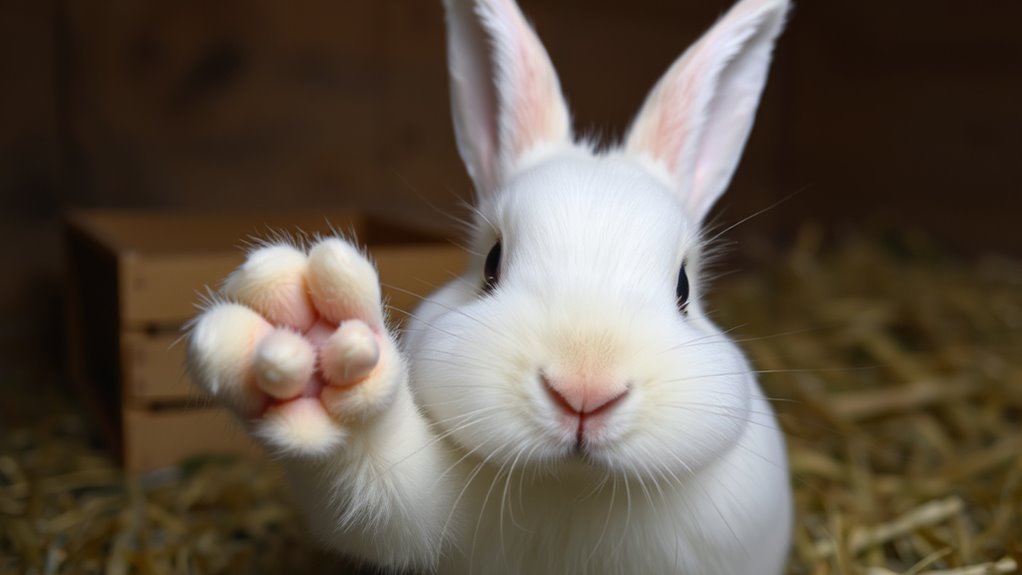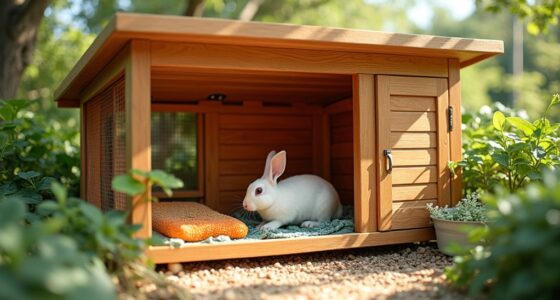If your rabbit thumps at 3 a.m., it’s likely trying to signal a threat, express discomfort, or boredom. Thumping is a natural way for rabbits to warn or communicate with their environment. To stop this behavior, make sure your rabbit’s cage is secure, calm, and cozy, and guarantee they get enough enrichment and interaction during the day. Keeping their environment peaceful can reduce late-night thumping, so explore more tips to help settle your rabbit through the night.
Key Takeaways
- Rabbits often thump at night to alert of perceived threats or disturbances in their environment.
- Ensure your rabbit’s cage is in a quiet, secure spot with familiar bedding and toys to reduce anxiety.
- Providing a consistent routine and ample daytime enrichment can decrease boredom and nighttime thumping.
- Avoid loud noises and sudden movements around your rabbit during nighttime hours to prevent startling it.
- Adjust cage setup, diet, and environment to promote calmness and minimize the need for thumping as a warning.

Ever wonder why your rabbit thumps loudly at 3 A.M.? That deep, resonant sound is your rabbit’s way of communicating something’s off. It might be alerting you to a perceived threat, feeling anxious, or just trying to get your attention. Thumping is a natural behavior, but if it happens consistently at night, it can be disruptive. To address this, start by examining your rabbit’s cage setup. A well-thought-out cage can make a big difference in reducing nighttime anxiety. Guarantee the cage is spacious enough for your rabbit to move comfortably, and place it in a quiet, secure area of your home. Covering part of the cage with a blanket or cloth at night can help create a cozy environment that mimics a burrow, making your rabbit feel safe. Also, adding familiar toys or a soft blanket can provide comfort and reduce stress.
Alongside improving the cage setup, you should consider diet adjustments. Rabbits are creatures of habit and thrive on consistency. A balanced diet rich in hay, fresh vegetables, and a small amount of pellets is crucial for their well-being. Feeding your rabbit right before bedtime can help promote better sleep and reduce nighttime agitation. Avoid giving your rabbit sugary treats or sudden changes in their diet, which can cause digestive discomfort and restlessness. Make sure your rabbit has had enough food to stay satisfied throughout the night, but not so much that they feel bloated or uncomfortable. Hydration is equally important, so always have fresh water available.
If your rabbit continues to thump despite these changes, look for other triggers. Loud noises, sudden movements, or unfamiliar scents can unsettle them during the night. Creating a calm environment, minimizing disturbances, and sticking to a routine helps your rabbit feel more secure. Sometimes, thumping is simply a way of expressing boredom or wanting more interaction. You might try spending more quality time with your rabbit during the day, providing toys, or even setting up a small play area outside the cage. Ensuring your rabbit has appropriate habitat can also help reduce stress and thumping behavior.
Frequently Asked Questions
Can Thumping Indicate Health Issues in My Rabbit?
You wonder if thumping signifies health issues in your rabbit. Thumping is a natural behavior, but it can also indicate stress or discomfort, making its significance important for rabbit health. If your rabbit thumps frequently or loudly, it might signal pain, fear, or illness. Pay attention to other signs like changes in appetite or activity, and consult a vet if you suspect health problems, ensuring your rabbit stays happy and healthy.
Is Thumping Always a Sign of Distress or Alertness?
Thumping isn’t always a sign of distress or alertness; it often relates to your rabbit’s behavior patterns and environmental cues. Your rabbit may thump to communicate excitement, curiosity, or to warn of potential threats. Pay attention to the context and surroundings—if they thump in response to loud noises or unfamiliar sights, it’s likely normal. However, persistent thumping with other signs of discomfort might indicate stress or health issues.
How Can I Tell if My Rabbit Is Scared or Angry?
You can tell if your rabbit is scared or angry by observing its body language cues and unusual thumping patterns. A scared rabbit might crouch low, flatten its ears, or have wide eyes, while an angry one may stand tall, thump loudly, and puff up its fur. Pay attention to these signs and changes in behavior, as they help you understand your rabbit’s emotional state and respond accordingly.
Does Age Affect How Often Rabbits Thump?
Coincidentally, as your rabbit matures, you’ll notice changes in its behavior. Age does influence how often rabbits thump, with younger rabbits often more active and alert, while aging behaviors can lead to less frequent thumping or different triggers. You might see increased thumping during specific times or in response to new stimuli. Understanding that maturity impacts their reactions helps you better interpret these signals and respond appropriately.
Are There Specific Sounds or Smells That Trigger Thumping?
You might notice your rabbit thumps in response to scent triggers or noise sensitivities. Loud or sudden noises, like slamming doors or thunderstorms, can set them off, as can strong or unfamiliar smells. Your rabbit’s heightened senses make them especially alert to scent triggers like cooking odors or perfumes. To reduce thumping, keep noise levels steady and avoid strong scents, creating a calmer environment that helps your rabbit feel secure.
Conclusion
By understanding your rabbit’s reasons for thumping at 3 a.m., you can address their needs and create a calmer environment. Consistent routines, ample enrichment, and a secure space help prevent midnight disturbances. Remember, a well-cared-for rabbit is less likely to act out of fear or boredom. When you tune into their cues, you’re not just putting out fires—you’re building trust. After all, it’s better to nip things in the bud than let the sleeping dog (or bunny) lie.










